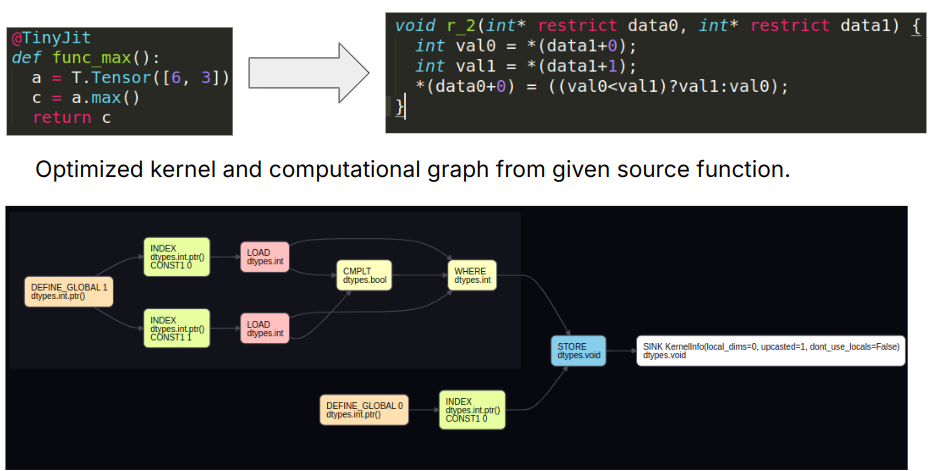TinyVerify - Translation Validation for ML Compilers
Translation Validation for the lightweight Tinygrad ML compiler
Project Overview
TinyVerify is a formal verification framework for validating compiler optimizations in Tinygrad, a minimalist machine learning framework. While traditional compilers like LLVM have established verification tools (Alive2), machine learning compilers face unique challenges in validating the complex transformations from high-level models to hardware-specific code. Our framework ensures these optimizations preserve program semantics by using SMT (Satisfiability Modulo Theories) solvers.
Technical Implementation
Kernel Validation
- Developed an end-to-end validation pipeline for GPU kernels generated by Tinygrad
- Validated transformations including operator fusion, constant folding, and memory layout optimizations
- Successfully verified 25 out of 49 fundamental operations (UOps) in Tinygrad’s IR
- Tested against real ML models including MNIST, validating hundreds of kernel optimizations
SMT Encoding Framework
We built a comprehensive encoding system using Z3 that handles:
- Primitive Types: Full support for various data types (bool, int16/64, uint32) using Z3 BitVectors
- Memory Operations: Modeled buffer operations (LOAD, STORE, INDEX) using uninterpreted functions
- Vector Operations: Support for fixed-size vectors leveraging Tinygrad’s lazy evaluation
- Control Flow: Implementation of WHERE (conditionals) and RANGE (loops) operations
- Floating Point: IEEE-754 compliant verification with configurable precision requirements
Undefined Behavior Tracking
Similar to Alive2 and LLVM, we implemented sophisticated UB tracking:
- Monitoring of overflow conditions and undefined memory access
- Propagation of “poison” values through operations
- Verification of optimization refinement - ensuring target code maintains or improves program determinism
Testing Framework
Litmus Tests
- Custom test suite with 12-15 Tinygrad functions
- Coverage of ~30 different IR rewrites
- Focus on tensor manipulations and matrix operations (GEMMs)
Pipeline Tests
- Automated extraction and verification of kernels from .pkl files
- Support for analyzing any Tinygrad model’s compilation process
- Integration with existing Tinygrad codebase through minimal modifications
Results and Current Work
Our framework successfully identified several precision-related issues in floating-point operations while validating Tinygrad’s optimization pipeline. Current development focuses on:
- Enhanced UB integration with Tinygrad’s IR
- Expanded floating-point support with IEEE compliance
- Extension to full compilation pipeline validation including scheduling

Visualization of a Tinygrad function’s kernel and its computational graph (IR)

Our Z3-based encoding architecture for kernel validation